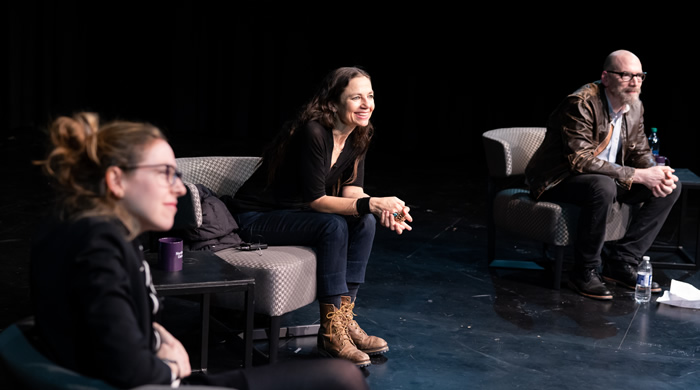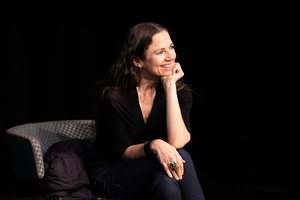Filmmaker Justine Bateman Discusses “Violet” as Part of Pritzker Pucker Studio Lab Programming

What happens if we actually stop listening to the negative thoughts drummed up by the committee of fear-mongering critics in our heads?
This is the central question in author and filmmaker Justine Bateman’s directorial debut, Violet, which was screened February 3 at the Virginia Wadsworth Wirtz Center for Performing and Media Arts in Abbott Hall at Northwestern’s Chicago campus. The event was sponsored by the new Pritzker Pucker Studio Lab for the Promotion of Mental Health via Cinematic Arts, the MFA in Writing for Screen and Stage, and the School of Communication’s Office of External Programs, Internships, and Career Services (EPICS).
“Years ago, I made a lot of fear-based decisions, and so when I got to the other side of that, I knew that I had a lot of time stolen from me where I hadn’t been myself,” Bateman said. “I wanted to exact revenge, so I made this film so that someone else could watch it and realize the voice, the negative voice, was lying, and the opposite was probably true.”
The titular character, Violet, played by Olivia Munn, is a beautiful, successful film executive who, despite all her outward success, is haunted by insecurities. In the film, a negative inner monologue, voiced by Justin Theroux, second guesses and judges every decision she makes, a critical peanut gallery in her head that lays bare her fears—of losing her job, her status, her security—even as she battles to find a freer, more confident path. Bateman, who wrote, directed, and produced the film, uses multiple devices to show the complexity of Violet’s inner world, including her true wants and needs, often scribbled on the screen like real-time journal entries, with pleas like why can’t I be happy? Often, the words run opposite to the inner critic, as her true self desperately wants to connect with others, while the negative voice perpetually warns that being vulnerable will end in loneliness or ridicule.
“The most important character in this film is the viewer,” Bateman said. “I designed it to be an immersive experience, so that the viewer is not watching the characters going through this thing, they can put it on as a coat, or get into it like a car, and experience the film. It’s been great to get responses from people, like ‘Have you been reading my diary? I can’t believe it.’ It’s men or women, it doesn’t matter the gender. It’s been very gratifying. My whole purpose for making the film really was if I could just get even five people walking out of the theater going, ‘Oh my God, those are lies.’”
The talkback was moderated by Department of Radio/Television/Film assistant professor Eliza Bent and Dave Tolchinsky, professor and director of the Pritzker Pucker Studio Lab.
Tolchinsky asked about the authenticity of the inner critic, which in Violet’s case stemmed from an overly critical mother.
“This is just the human condition, and it doesn’t matter if you had a shitty dad, or a bad mom, like Violet,” Bateman said. “It could be a teacher you had. It’s just enough of a seed to start a little dialogue.”
In the film, Violet’s boss, who often says terrible things to her and does what he can to undermine her confidence to elevate himself, sometimes mimics the voice.
 “Often, we’ll have someone in our life who is saying the same thing to us, that our negative thoughts are saying to us. You ever have that happen?” Bateman continued. “How is that person saying the same thing that’s in my head? They’re both tuned into the same radio station. The voice is hassling them, too. I wanted to help people understand. When someone is being negative toward you, they’re telling them about themselves, and not telling you about you.”
“Often, we’ll have someone in our life who is saying the same thing to us, that our negative thoughts are saying to us. You ever have that happen?” Bateman continued. “How is that person saying the same thing that’s in my head? They’re both tuned into the same radio station. The voice is hassling them, too. I wanted to help people understand. When someone is being negative toward you, they’re telling them about themselves, and not telling you about you.”
She added that she wanted to make Violet’s inner voice sound as different from Violet herself as she could in order to give the audience a more objective view of the critic.
“The thing that helped me the most … was to think of those thoughts as if someone else was saying them,” Bateman said. “I gave them validity if I thought they were my own thoughts. But if someone else was saying them, would I give them as much credence? Or would I question it?”
Bent asked Bateman what she sees as the ultimate purpose of the inner critic and why we often self-sabotage.
“I do believe it’s the survival mechanism in us,” Bateman said. “Our system is set up to keep us alive and procreate, and on and on and on. And when we’re little kids, whatever society you grow up in, you learn about how you survive in that society. If you have a parent or teacher or something criticizing you, you learn to listen to those criticisms, because if you don’t that could put you in danger of being ostracized, or destitute and then dying. It’s irrational, but our system doesn’t know it’s irrational until you’re able to say it out loud and write it out… [This movie] is basically a map, to get from making decisions out of fear to making decisions out of instinct.”
Sophie Debruijn, an MFA student and grant-funded filmmaker in the Pritzker Pucker Studio Lab, called the screening and talkback enlightening.
“I always find it so fascinating when an artist takes the time to give us a glimpse of their process,” she said. “And I felt Justine Bateman really did a wonderful job of connecting the dots.”
